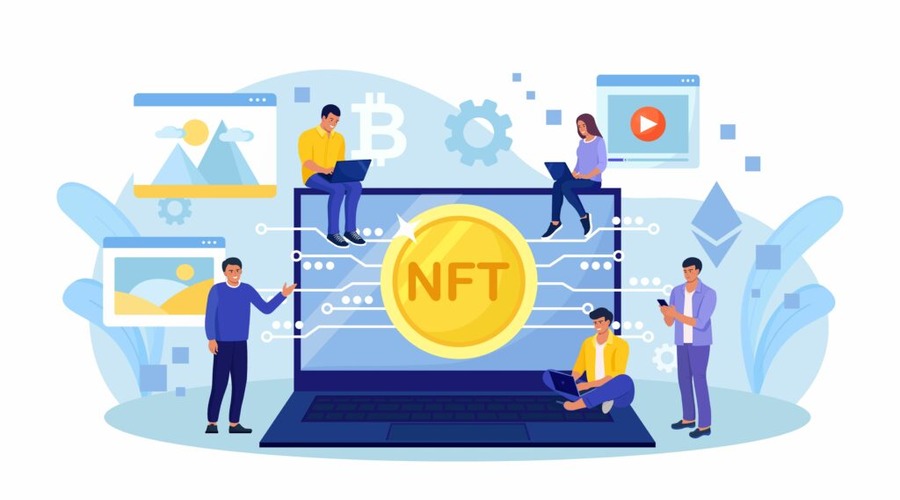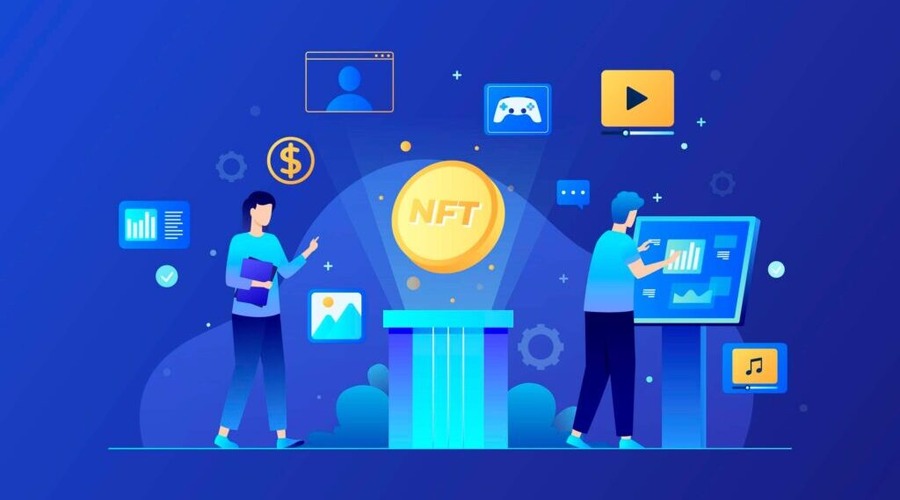Online marketplaces have been the go-to place for buying and selling goods and services for years now. However, with the rise of Non-Fungible Tokens (NFTs), the online marketplace scene is changing. In this article, we will explore the impact of NFTs on online marketplaces and how they are changing how we buy and sell goods and services online.
What are NFTs?
NFTs, short for Non-Fungible Tokens, are unique digital assets that are verified on a blockchain network. Each NFT is one-of-a-kind, meaning it cannot be replicated or exchanged for something else, hence the name non-fungible. NFTs can represent anything from digital art and music to virtual real estate and gaming items.
The Rise of NFTs in Online Marketplaces
With the advent of blockchain technology, NFTs have become increasingly popular in the online marketplace. Online marketplaces like OpenSea, Rarible, and SuperRare, among others, have become the hub for buying and selling NFTs. In fact, the NFT market has seen explosive growth, with sales surpassing $2 billion in the first quarter of 2021 alone.
How NFTs are Changing the Online Marketplace
NFTs are changing the online marketplace in several ways. Here are some of the significant changes:
1. Ownership and Authenticity
NFTs provide proof of ownership and authenticity of digital assets, which was previously impossible to establish. With NFTs, artists, musicians, and creators can prove that their digital assets are unique and authentic, and the buyer can verify their ownership. This verification process provides a level of trust between buyers and sellers, making transactions more secure.
2. New Revenue Streams
NFTs are providing new revenue streams for artists, musicians, and creators. NFTs allow creators to sell their digital assets directly to buyers, eliminating the need for intermediaries like record labels or art galleries. This direct-to-consumer model enables creators to retain a more significant share of the revenue generated from their work.
3. Democratizing the Market
NFTs are democratizing the market by enabling anyone to participate in the buying and selling of digital assets. In the traditional marketplace, access to buyers and sellers was restricted to a select few. NFTs provide an opportunity for creators and buyers from all over the world to participate in the market, opening up new opportunities for both parties.
4. Disrupting Traditional Business Models
NFTs are disrupting traditional business models by enabling new ways of monetizing digital assets. For example, musicians can sell limited-edition digital albums or virtual concert tickets, and artists can sell one-of-a-kind digital art pieces. This disruption is creating new business models that were previously not possible.
The Impact of NFTs on the Art World
One area where NFTs have made a significant impact is in the art world. NFTs have opened up new opportunities for artists to monetize their digital art pieces. In the traditional art world, artists would sell their physical artwork through galleries or auction houses, which took a significant portion of the sales revenue. With NFTs, artists can sell their digital artwork directly to buyers, without the need for intermediaries, and retain a more significant share of the revenue generated.
Moreover, NFTs have made it easier for artists to establish ownership and authenticity of their digital art pieces. This has helped to combat issues of piracy and plagiarism that have plagued the digital art world.
NFTs in the Music Industry
NFTs are also making waves in the music industry. Musicians can use NFTs to sell limited-edition digital albums or virtual concert tickets, creating new revenue streams. In March 2021, the band Kings of Leon released their latest album as an NFT, becoming the first band to do so.
NFTs are also helping to address issues of ownership and royalties in the music industry. Musicians can use NFTs to establish ownership of their music and ensure they receive appropriate royalties for their work.
NFTs in the Gaming Industry
The gaming industry is another area where NFTs are having an impact. NFTs are being used to represent unique in-game items, such as weapons or skins, which players can buy and sell in online marketplaces. This has created a new economy within the gaming industry, where players can earn real money by selling their in-game items.
NFTs are also helping to address issues of ownership in the gaming industry. In traditional gaming models, players do not own their in-game items, and game publishers can take them away at any time. With NFTs, players own their in-game items, and game publishers cannot take them away without the owner’s consent.
Challenges and Opportunities of NFTs in Online Marketplaces

While NFTs are presenting new opportunities in the online marketplace, they also come with challenges. One challenge is the environmental impact of blockchain networks, which are used to verify and authenticate NFTs. The energy required to power these networks is significant and has raised concerns about the sustainability of NFTs.
Moreover, the NFT market is still relatively new and can be volatile. Prices for NFTs can fluctuate widely, making it challenging for buyers and sellers to establish fair market values.
The Role of Cryptocurrency in NFT Marketplaces
NFTs are often purchased using cryptocurrency, such as Bitcoin or Ethereum. The use of cryptocurrency in NFT marketplaces has led to new opportunities for investors to buy and sell NFTs. Moreover, the use of cryptocurrency provides greater security for buyers and sellers, as transactions are recorded on a decentralized blockchain network, making them more secure.
However, the use of cryptocurrency in NFT marketplaces can also be a barrier for some buyers and sellers who are not familiar with the technology. Additionally, the volatility of cryptocurrency prices can make it challenging for buyers and sellers to establish fair market values for NFTs.
NFTs and Intellectual Property Rights
NFTs are also changing the way we think about intellectual property rights. With NFTs, creators can establish ownership and authenticity of their digital assets, which can help protect their intellectual property rights. However, NFTs can also create new challenges for intellectual property rights, particularly when it comes to the ownership of derivative works.
For example, if an artist sells an NFT of their digital artwork, who owns the rights to create derivative works based on that artwork? This is an area that is still being explored, and it is likely that we will see new laws and regulations developed in response to the rise of NFTs.
NFTs and Social Media
NFTs are also making an impact on social media platforms. Platforms such as Twitter and Instagram are being used to promote and sell NFTs. Moreover, social media influencers are using NFTs as a way to monetize their social media presence. For example, an influencer could create an NFT of their most popular post and sell it to their followers.
NFTs are also changing the way we think about social media content ownership. With NFTs, creators can establish ownership of their social media content, which can help protect their intellectual property rights.
NFTs and the Future of eCommerce
NFTs are likely to have a significant impact on the future of eCommerce. With the rise of NFTs, we are likely to see a shift towards more decentralized and peer-to-peer eCommerce models. This shift could lead to a more equitable distribution of wealth, as creators can sell their digital assets directly to buyers, without the need for intermediaries.
Moreover, NFTs could lead to new eCommerce models that were previously not possible. For example, NFTs could be used to represent real-world assets, such as property or vehicles, enabling the buying and selling of these assets in a secure and transparent way.
NFTs and Sustainability
The use of blockchain technology to verify and authenticate NFTs has raised concerns about the environmental impact of NFTs. The energy required to power these networks is significant, and it has been estimated that a single NFT transaction can consume as much energy as an average household in a month.
As the demand for NFTs grows, so does the energy consumption of blockchain networks. This has led to calls for more sustainable blockchain solutions, such as the use of renewable energy sources or more efficient consensus algorithms.
NFTs and Identity
NFTs are also being used to represent digital identity, providing a secure and transparent way to verify identity online. For example, an NFT could be used to represent a person’s verified social media account, enabling users to prove their identity across different platforms.
Moreover, NFTs could be used to represent verified credentials, such as educational degrees or professional certifications. This could help combat issues of fraud and provide a more secure and reliable way to verify credentials.
The Future of NFTs in Online Marketplaces
The future of NFTs in online marketplaces looks bright. With more and more creators and buyers participating in the NFT market, we can expect to see a continued growth in the NFT market. Additionally, with the increasing awareness of NFTs, we can expect to see more use cases beyond art, music, and gaming. NFTs have the potential to revolutionize the way we buy and sell goods and services online.
Conclusion
NFTs are changing the way we buy and sell goods and services online. They are providing new revenue streams for creators, democratizing the market, and disrupting traditional business models. As the NFT market continues to grow, we can expect to see more use cases and a continued impact on the online marketplace.

